Overview
In the demanding world of healthcare, providers often face overwhelming administrative burdens that can detract from their primary focus: patient care. It’s a challenge that resonates deeply, as every moment spent on paperwork is a moment taken away from those in need.
This article explores seven free AI dictation tools designed to alleviate these pressures, enabling healthcare professionals to dedicate more time to their patients. Tools like:
- CosmaNeura
- Freed
- Suki
- Mobius MD
- Rad AI
- Linguatec Voice Pro Dictate
- Zapier
stand out for their ability to streamline documentation processes, enhance accuracy, and adhere to ethical principles.
Imagine a workday where administrative tasks are automated, allowing for more meaningful interactions with patients. These tools not only improve efficiency but also transform the landscape of healthcare documentation, providing a much-needed support system for providers.
By embracing these innovative solutions, healthcare professionals can reclaim valuable time and focus on what truly matters—delivering compassionate care. If you’re ready to explore how these AI dictation tools can make a difference in your practice, take the next step towards a more efficient and patient-centered approach.
Introduction
In an age where technology is reshaping the healthcare landscape, many healthcare providers are feeling overwhelmed by the administrative burdens that come with it. The integration of artificial intelligence into documentation processes is proving to be a game-changer. Imagine a world where you can enhance efficiency and improve patient care simultaneously. AI-driven solutions are revolutionizing how healthcare providers manage administrative tasks, allowing you to focus more on meaningful patient interactions rather than being bogged down by paperwork.
Platforms like CosmaNeura, Freed, and Suki are leading the charge in this transformation. These innovative tools not only streamline workflows but also align with ethical standards and values that matter to you. As the industry embraces these advancements, consider the potential for improved patient outcomes and reduced clinician burnout. It’s becoming increasingly evident that AI can alleviate some of the stress you face daily, fostering a more supportive environment for both you and your patients.
This article explores the transformative power of AI in healthcare documentation, highlighting how these advancements can help you reclaim your time and focus on what truly matters—your patients. Let’s delve into the solutions that can make a real difference in your practice.
CosmaNeura: Transforming Healthcare Documentation with AI-Powered Dictation
CosmaNeura stands at the forefront of transforming medical records with its innovative platform for AI dictation free, thoughtfully designed for primary service providers who uphold Christian principles. By automating essential administrative tasks like appointment scheduling, medical record management, and billing, CosmaNeura empowers clinicians to devote more time to patient care. This shift significantly enriches the quality of interactions, fostering deeper connections between providers and patients. Moreover, the platform integrates ethical principles rooted in Catholic teachings, ensuring that record-keeping methods not only enhance efficiency but also align with moral responsibilities in delivering medical services.
As the medical landscape evolves, the importance of AI tools becomes increasingly clear. By 2025, the integration of AI in medical record-keeping is expected to streamline processes, with 89% of medical professionals in the EU believing that AI will greatly accelerate workflows. This transition is particularly vital for Christian providers, who can harness AI to maintain their commitment to compassionate support while navigating the complexities of documentation.
Furthermore, the US market for generative AI in medical services, valued at $1.07 billion in 2022, is anticipated to exceed $10 billion by 2028. This remarkable growth trajectory promises to revolutionize client interactions and personalize treatment approaches. Such advancements directly impact record-keeping practices, enabling Christian providers to enhance administrative efficiency and reclaim precious time that was once consumed by paperwork. Additionally, 9% of psychiatrists believe that AI could offer compassionate support to patients, aligning with the ethical considerations that are paramount for Christian medical practitioners. With AI dictation free tools, medical providers can greatly enhance administrative efficiency while ensuring their practices resonate with their values. This dual focus on technological advancement and ethical integrity positions CosmaNeura as a transformative force in the medical field. It enables providers to deliver compassionate care without the burden of excessive record-keeping. Continuous education supported by AI also prepares medical teams for the evolving healthcare landscape, ensuring they are equipped to meet changing record-keeping needs.
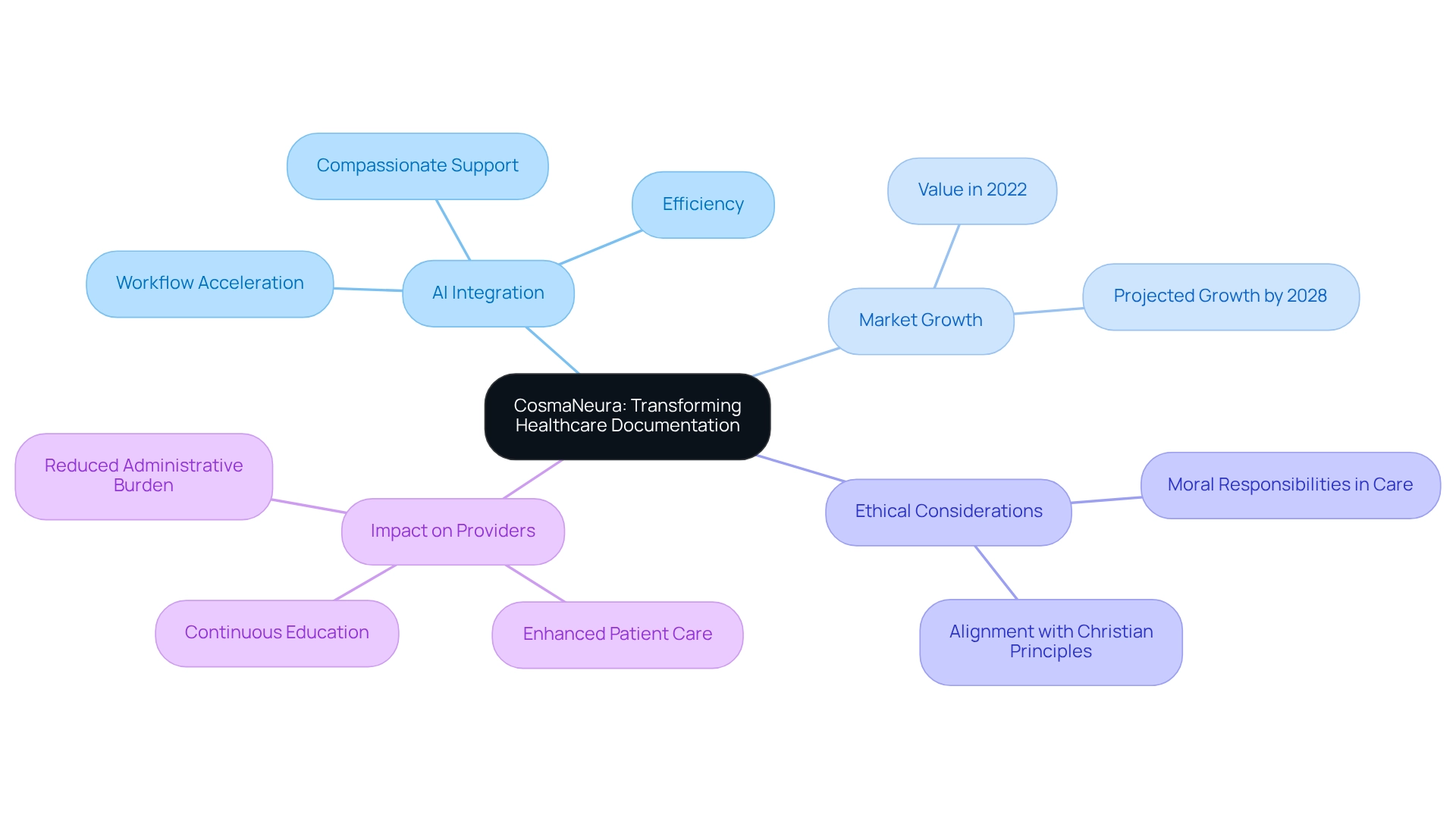
Freed's AI Medical Dictation: Enhancing Efficiency and Accuracy in Clinical Documentation
Healthcare providers often face overwhelming administrative burdens that can detract from their ability to deliver quality patient care. Freed's AI dictation free medical software is here to help. Engineered to enhance the efficiency and accuracy of clinical documentation, this innovative tool uses advanced speech recognition technology to record interactions in real-time. This allows healthcare professionals to prioritize patient engagement over time-consuming administrative tasks.
Imagine being able to optimize procedures like appointment scheduling and medical record management. Freed's software reduces the strain of these tasks, enabling physicians to reclaim precious time for high-quality service. It excels in producing structured clinical notes, including SOAP notes, ensuring that records are not only swift but also compliant with medical standards.
This groundbreaking tool demonstrates the transformative potential of AI in alleviating physician burnout and improving patient care by lightening the load of record-keeping. Recent studies indicate that using ambient AI scribes is linked to a statistically significant reduction in time spent on electronic health records (EHR) outside of working hours. This highlights the efficiency gains that Freed's technology offers.
Furthermore, a case study titled 'Doctors' Perspectives on AI' reveals a consensus among medical professionals regarding the potential benefits of AI, showcasing its growing acceptance across various specialties. As more medical experts recognize the advantages of AI, Freed stands out as a leader in enhancing clinical record precision and optimizing workflows through its AI dictation free solutions. For those contemplating a transition to AI-driven services, consider trying Freed's software. It could provide valuable insights into its capabilities and the positive impact it can have on your clinical practice. How might this tool transform your daily routine and enhance the care you provide to your patients?
Suki: Streamlining Documentation with Advanced EHR Integration
In the demanding world of healthcare, providers often face emotional challenges that can weigh heavily on their practice. Administrative burdens can detract from the precious time spent with patients, impacting the quality of care they deliver. How can we alleviate this pressure? Suki stands out in the healthcare record field with its advanced integration capabilities across major EHR systems.
This bidirectional functionality allows clinicians to effortlessly access client data and update records, significantly reducing the time spent on administrative tasks. Imagine an AI assistant that employs ai dictation free to listen to clinician-patient interactions and automatically generates clinical notes, ensuring documentation is both precise and timely. This streamlined approach not only boosts efficiency but also allows medical professionals to focus more on individuals, reinforcing their dedication to providing compassionate care aligned with Catholic principles.
Consider the findings from a study involving 1,727 office-based physicians, where many reported clinical benefits from their EHR systems, including enhanced treatment and improved access to charts. As of 2016, over 95% of all qualified and Critical Access hospitals demonstrated meaningful use of certified health IT, underscoring the essential role of EHR integration in modern medical practice. Additionally, a report from the CDC/NCHS revealed that 85 percent of doctors in this group stated that EHR usage had improved overall service. By easing the administrative load through AI-driven solutions like Suki, which provides ai dictation free for tasks such as note-taking and data entry, medical providers can enhance diagnostic accuracy and improve patient outcomes. This ultimately transforms medical service delivery and addresses the challenges faced by the industry, such as physician burnout and fragmented care.
Let’s embrace these innovations together, ensuring that healthcare providers can dedicate more time to what truly matters: caring for their patients.
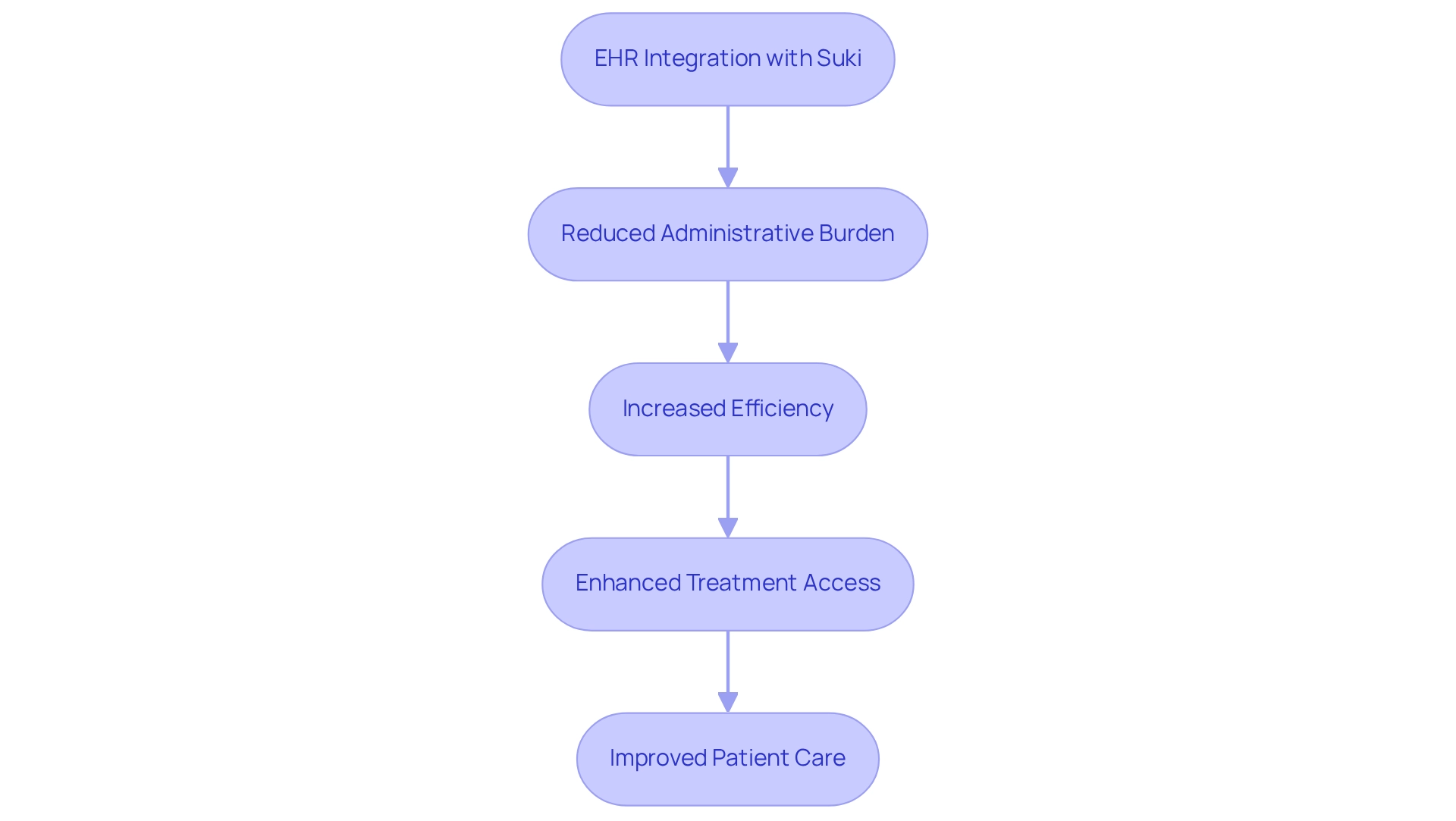
Mobius MD: Pioneering AI Solutions for Medical Transcription and Documentation
Mobius MD is at the forefront of transforming medical transcription and record-keeping with its innovative solutions, including ai dictation free technology. By utilizing sophisticated speech recognition technology, the platform provides ai dictation free for real-time transcription, enabling medical professionals to document client interactions as they happen. This functionality not only improves the accuracy of medical records but also enables clinicians to use ai dictation free, significantly reducing the time they spend on documentation tasks. Imagine the relief as physicians alleviate the burden of tedious administrative duties, streamlining processes like appointment scheduling and medical record management.
Research indicates that AI transcription tools can save medical providers up to 3 hours daily. This valuable time can then be redirected towards patient support, ultimately enhancing overall service delivery. As healthcare organizations increasingly seek innovative methods to improve their services, this statistic underscores a growing trend.
Yet, many medical startups face resistance to innovation. Physicians, often risk-averse, may hesitate to embrace changes that could impact the quality of care. However, Mobius MD’s solutions seamlessly integrate with existing medical systems, allowing providers to maintain their workflow without disruption. This capability is crucial in a landscape where medical organizations are actively pursuing new ways to enhance service delivery.
As we look towards 2025, Mobius MD continues to lead the charge in AI transcription technology, offering solutions that not only streamline documentation but also enrich clinician workflow. The impact of real-time transcription on healthcare delivery is profound, fostering a more efficient and patient-centered approach to care. Moreover, as Rebecca Pifer pointed out, AWS does not gather or utilize individuals' health information for research and development under its business associate agreements with healthcare clients, ensuring that data privacy remains a priority in the implementation of these technologies. How might embracing these advancements transform your practice and patient care?
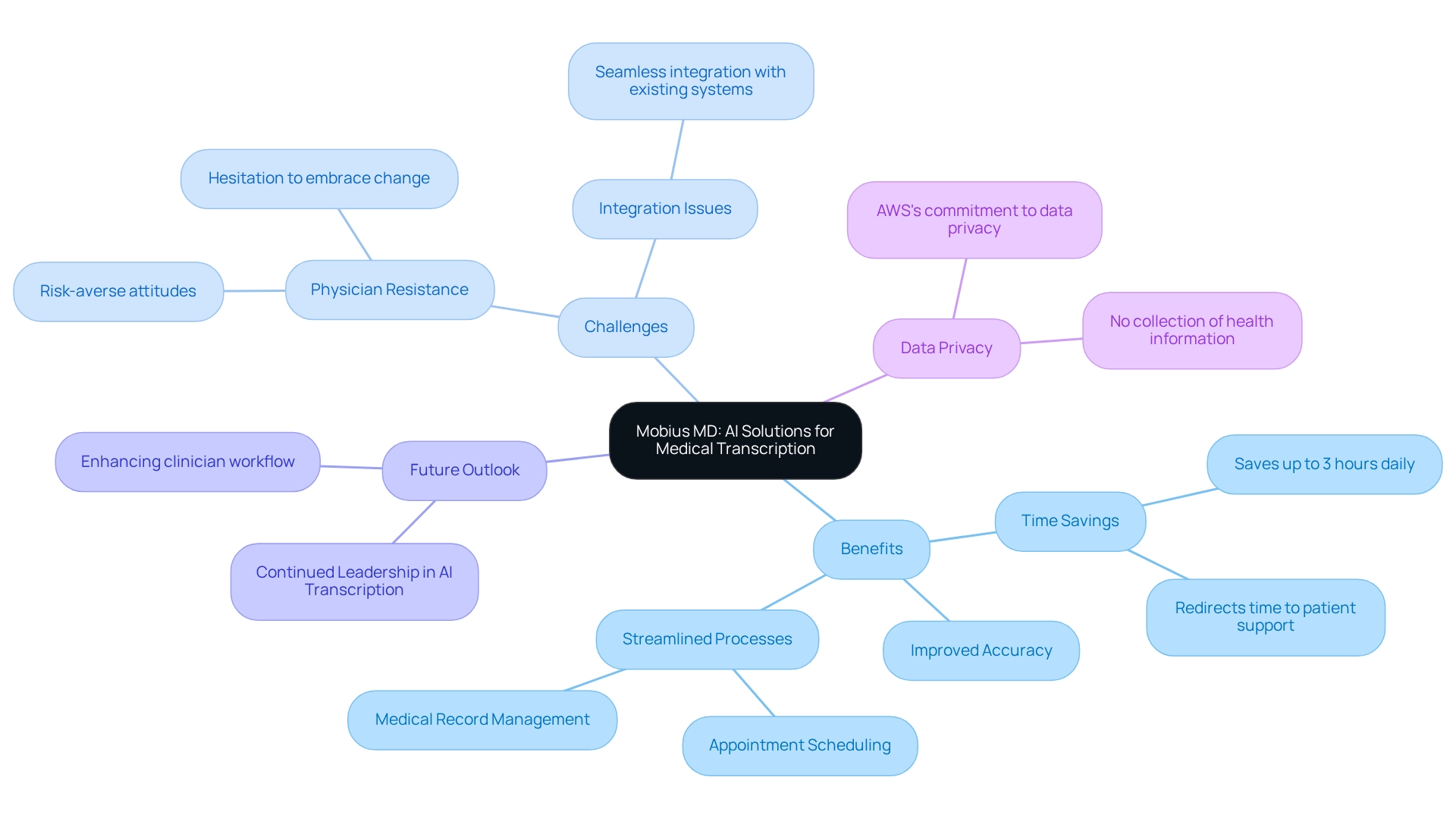
Rad AI: Revolutionizing Radiology Reporting with AI Technology
Rad AI is transforming the landscape of radiology reporting with its innovative AI technology. By harnessing advanced machine learning algorithms, Rad AI produces thorough and accurate reports at an extraordinary speed, significantly reducing the time radiologists spend on documentation. This remarkable efficiency not only streamlines workflow but also allows radiologists to devote more time to supporting their clients rather than managing administrative tasks.
In 2025, the integration of Rad AI's technology is expected to greatly enhance radiology workflow efficiency. Research indicates that AI applications in medicine could lead to annual savings of up to $150 billion for the U.S. medical economy by 2026. A striking illustration of AI's positive impact is the NHS's implementation of an AI triage system for chest X-rays, which processed over 650,000 X-rays in its first year and cut critical finding reporting delays by 91%, potentially preventing 58 adverse events.
Furthermore, family medicine expert Michelle Thompson noted that AI allows physicians to engage fully with their patients, highlighting the technology's role in improving care quality. By alleviating the burden of time-consuming administrative tasks, such as documentation and reporting, Rad AI showcases how AI can enhance diagnostic accuracy and lead to better outcomes in healthcare settings. This commitment to refining diagnostic reporting ensures that medical professionals can focus on what truly matters: the well-being of those they serve.
Linguatec Voice Pro Dictate: Professional Dictation Software for Healthcare Providers
Linguatec Voice Pro Dictate is a standout choice for medical practitioners seeking AI dictation free to help alleviate the stress of documentation. It’s designed with empathy for the challenges healthcare providers face, offering high recognition accuracy that allows clinicians to create detailed client notes swiftly and efficiently. Imagine being able to focus more on patient care rather than getting bogged down by administrative tasks. With its AI dictation free features, this tool significantly speeds up the record-keeping process, allowing you to dedicate more time to what truly matters—your patients.
The impact of professional dictation software on record-keeping speed is profound. Research indicates that adopting speech recognition (SR) technologies can lead to a remarkable boost in efficiency. One report revealed an enhancement in SR usage from 50% to 74.4% post-implementation. Kristin E Yakimow, MS, MBA, highlights that while 57% of providers use SR to improve workflow, an impressive 84% experienced actual improvements after its implementation. This aligns with the growing recognition of the importance of accurate records in healthcare, a sentiment echoed by specialists in the field.
Linguatec Voice Pro Dictate not only simplifies record-keeping but also ensures adherence and accuracy—critical elements in medical settings. A case study titled "Financial Impact of SR Technology on Medical Transcription Costs" showed that medical transcription costs began to decline during the pilot phase of SR technology implementation, suggesting a positive financial outcome associated with its use. As more medical providers embrace AI dictation free software, the benefits of real-time dictation become increasingly evident, enhancing the precision of patient notes and overall care quality.
With positive reviews emerging in 2025, Linguatec continues to demonstrate its value in transforming medical record practices. Moreover, advancements in the field, such as those by Coherent Solutions, which leverages 30 years of experience to develop tailored NLP and speech-to-text models trained on medical datasets, underscore the ongoing innovation in dictation technologies.
Are you ready to explore how Linguatec Voice Pro Dictate can enhance your practice? Embrace the future of efficient documentation and focus on what you do best—caring for your patients.
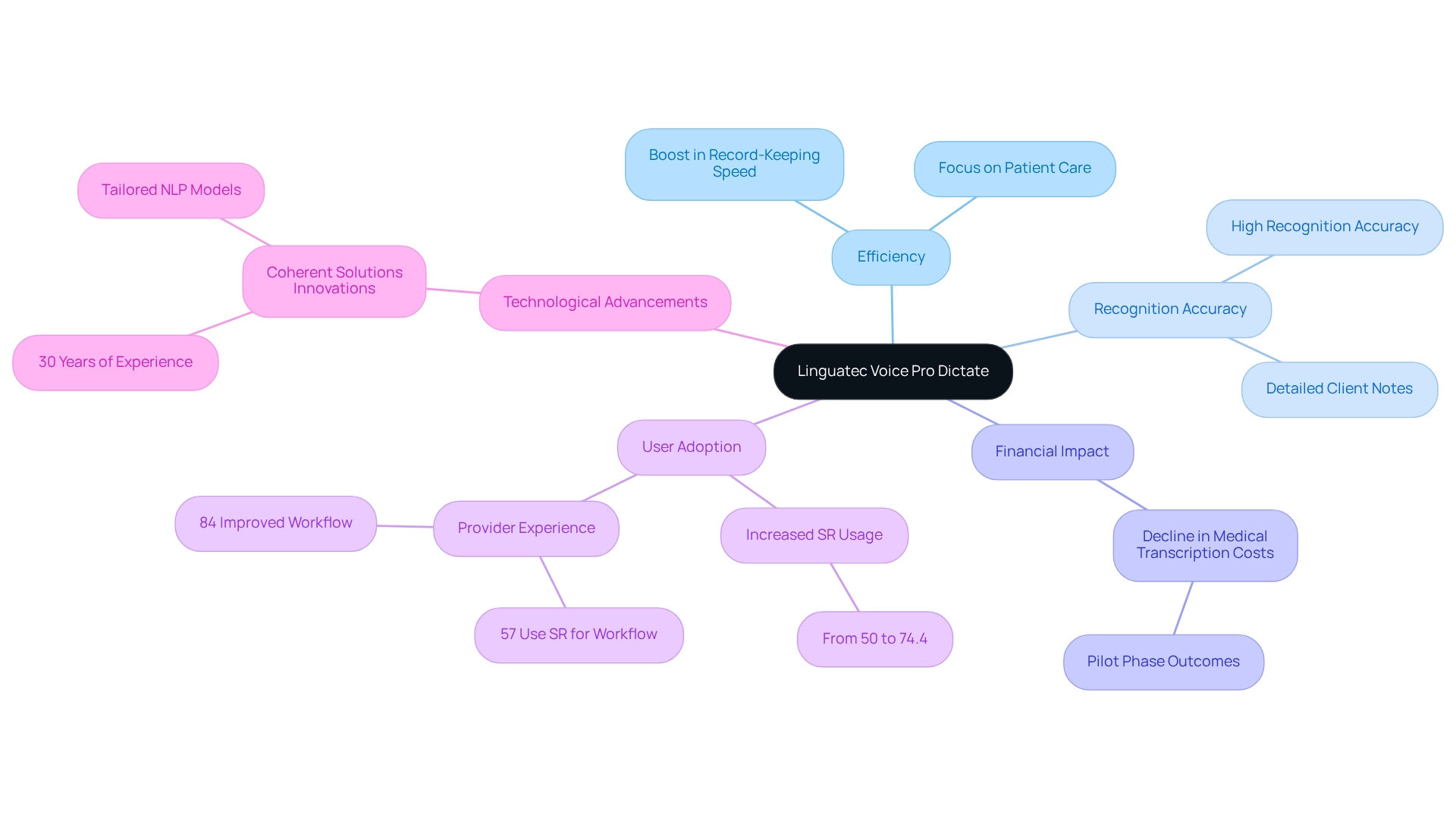
Zapier: Exploring the Best Dictation Software for Healthcare Documentation
Zapier is a revolutionary tool that can truly transform the lives of medical professionals. It enables the integration of leading AI dictation free software into record-keeping processes, helping clinicians navigate the often overwhelming administrative landscape. By connecting various applications, Zapier automates workflows, enabling healthcare providers to choose AI dictation free tools that truly meet their specific needs. This ensures seamless interoperability across systems, which is so vital in today’s fast-paced medical environment.
Imagine the relief of knowing that key features of Zapier allow for integration with various medical applications. This capability enables automated data transfer, significantly reducing manual entry errors. Not only does this boost documentation efficiency, but it also enhances patient support and satisfaction. By streamlining essential administrative tasks—like appointment scheduling, medical record management, and billing—medical providers can alleviate the burden of time-consuming processes. This reclaiming of valuable time allows them to focus on what truly matters: delivering high-quality care.
However, it’s important to acknowledge the challenges that come with implementing such automation tools. High costs and the need for training medical professionals to effectively use new systems can be daunting. Yet, consider the success stories; for instance, hospitals that have embraced workflow automation achieved 100% compliance with data protection regulations. This minimizes the risk of data breaches through consistent automated access control.
Furthermore, automated systems for equipment maintenance have shown to enhance equipment uptime by 20%, illustrating the operational efficiency that automation can bring to medical environments. As the medical automation market continues to expand, particularly in North America, utilizing tools like Zapier can lead to significant improvements in record-keeping workflows. This ultimately benefits both providers and patients alike.
As highlighted by the National Institute of Health, in 2023, over 11 million robotic surgeries took place globally. This statistic underscores the growing dependence on technology in medical services and the importance of automation tools like Zapier in enhancing record-keeping processes.
Key Benefits of Using Zapier:
- Streamlined workflows that save time.
- Reduced manual entry errors for better accuracy.
- Enhanced patient satisfaction through improved support.
Let’s embrace these advancements together, ensuring that healthcare providers can focus on what they do best—caring for patients.
Real-Time Telehealth Transcription: Ensuring Accurate Documentation in Virtual Care
In the fast-paced world of healthcare, ai dictation free emerges as a vital ally for ensuring accurate documentation during virtual consultations. Have you ever felt the weight of administrative tasks pulling you away from patient care? By capturing conversations as they happen, these transcription tools empower healthcare providers to keep comprehensive records of patient interactions, alleviating some of that burden. This capability not only supports precise billing and coding but also significantly enhances the quality of service by ensuring that all pertinent information is documented, highlighting the importance of ai dictation free solutions as the adoption of telehealth continues to grow.
These tools enable providers to offer effective support remotely, allowing them to focus on what truly matters: patient care. Recent advancements in telehealth underscore the expanding role of technology in medical delivery. For instance, case studies, including one on CosmaNeura's platform, highlight how AI-driven services like telehealth transcription can improve service delivery and boost job satisfaction among clinicians, enabling them to dedicate more time to care rather than administrative duties.
Imagine a world where time-consuming tasks such as appointment scheduling and medical record management are automated. AI solutions can lessen the load on providers, freeing them to engage in meaningful patient interactions. To effectively implement ai dictation free transcription tools in your practice, consider evaluating various options that align with your specific needs and the ethical guidelines of your medical approach.
Additionally, ensure that the chosen tools integrate seamlessly with your existing systems. This will not only maximize efficiency but also enhance your documentation processes, allowing you to focus on what you do best—caring for your patients.
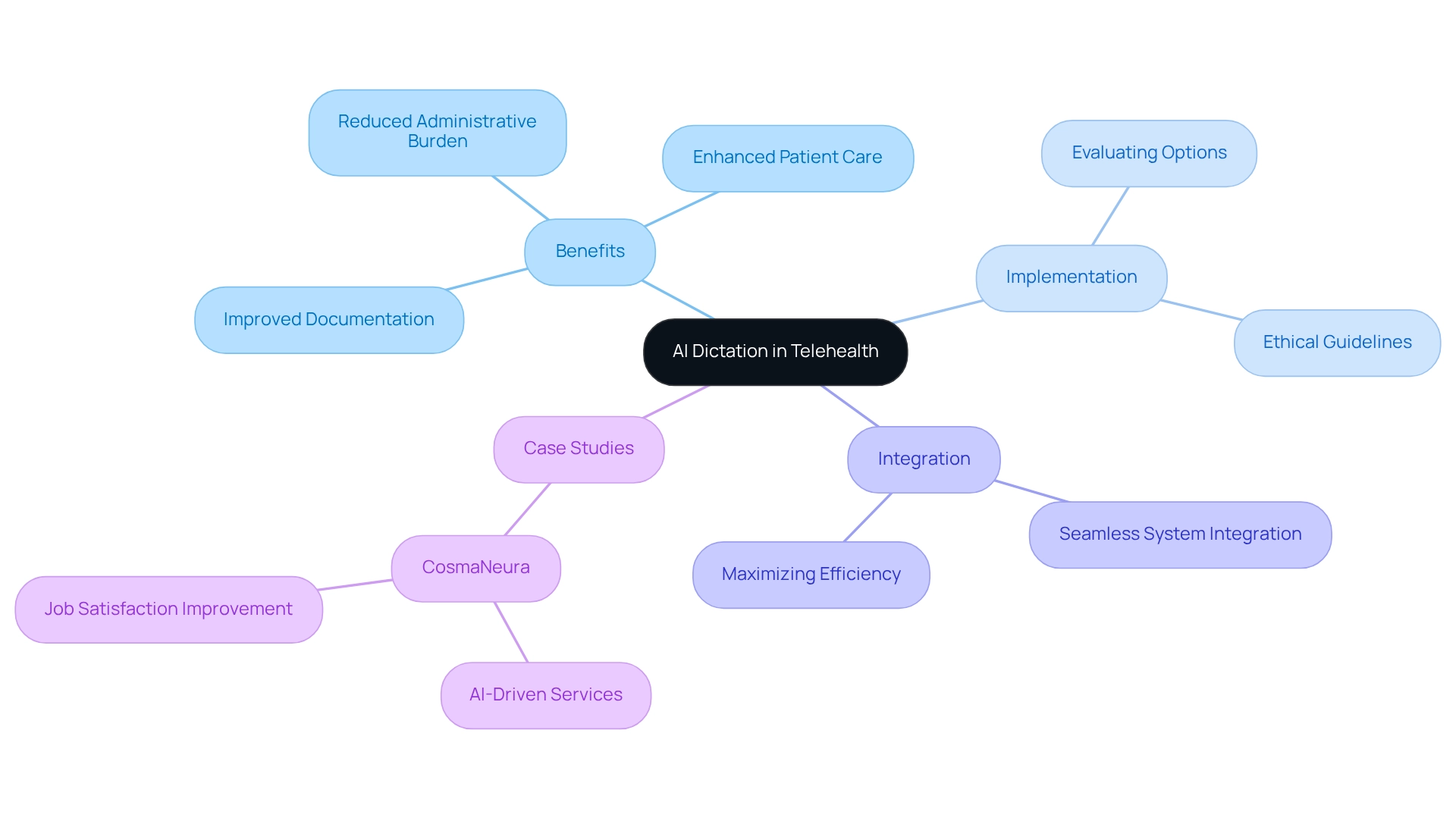
AI-Driven Billing Optimization: Maximizing Revenue through Intelligent Analysis
Healthcare providers often face significant emotional challenges as they navigate the complexities of revenue cycle management. CosmaNeura’s AI-driven billing optimization tools are here to help transform this experience. By intelligently analyzing client interactions, these tools suggest precise billing codes, maximizing revenue potential for each visit. Imagine the relief of knowing that missed opportunities for revenue recovery can be identified through retrospective billing analysis, allowing practices to enhance their financial performance significantly.
The administrative burdens of billing can detract from the time spent on patient care, which is where AI comes in. By incorporating AI into billing procedures, service providers can reduce their administrative loads, allowing them to devote more time to supporting their patients. CosmaNeura's solutions streamline processes such as appointment scheduling, medical record management, and billing through automation. This not only improves job satisfaction but also fosters a healthier financial environment for practices.
As generative AI continues to evolve, its role in optimizing billing accuracy and efficiency is expected to grow. The case study titled "The Rise of Generative AI in Healthcare" illustrates how generative AI is transitioning from a conceptual phase to a practical tool, significantly enhancing operational outcomes. Projections indicate that by 2035, AI will surpass human capabilities in managing complex data tasks, including billing optimization. This adoption of technology is not merely a trend; it is a necessary evolution in the medical field, ensuring that providers can thrive while delivering exceptional care.
Are you ready to embrace this change? By leveraging these innovative tools, healthcare providers can not only enhance their financial health but also improve the quality of care they offer to their patients.
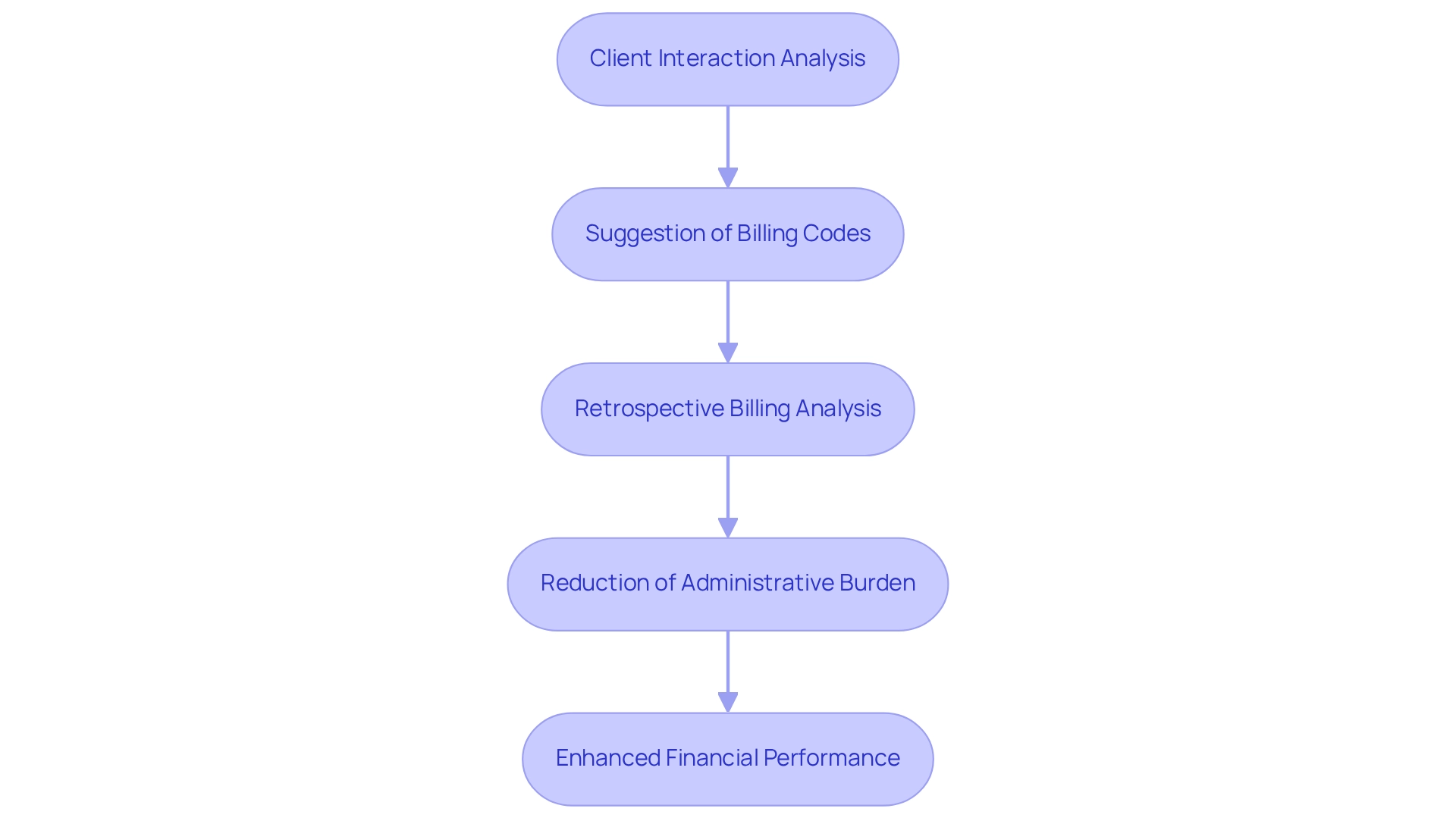
Ethical AI in Healthcare Documentation: Aligning with Faith-Based Values
Ethical AI in medical records is not just a necessity; it is a lifeline for providers who hold faith-based principles dear. How can we foster trust between individuals and providers? By aligning AI solutions with ethical guidelines that emphasize transparency, accountability, and respect for individual privacy. This commitment allows medical organizations to implement AI technologies that enhance documentation while honoring their ethical responsibilities.
As we approach 2025, the importance of ethical AI implementation becomes even more pronounced. The potential legal consequences of unauthorized access or mishandling of patient data loom large, with fines and penalties that could soar to $1.5 million per violation under HIPAA regulations. It's vital to address ethical challenges—such as safety, liability, and data bias—to responsibly integrate AI into medical care. This is especially critical for medical startups navigating a complex regulatory landscape, where compliance with the FDA and HIPAA is essential, and traditional accelerators may lack the specialized knowledge to guide them effectively.
Consider the case study titled "Ethical Challenges of AI in Healthcare." It highlights the significance of informed consent and data ownership, showing how organizations that proactively address these dilemmas can reduce risks and foster trust among individuals. This dedication not only leads to improved patient outcomes but also nurtures the compassionate spirit that is so vital to faith-based medical practices.
Additionally, organizations can gain from collaborating with third-party vendors that provide data collection and aggregation tools. These partnerships can help structure diverse data sources for AI analysis while upholding ethical standards. By prioritizing these values and understanding the unique buying processes and decision-making hierarchies within healthcare organizations, providers can better navigate the complexities of AI in healthcare. This ensures that their solutions embody both technological advancement and ethical integrity, nurturing a healthier future for all.
Conclusion
The integration of artificial intelligence into healthcare documentation is more than a technological advancement; it signifies a meaningful shift towards more efficient and compassionate care. Platforms like CosmaNeura, Freed, Suki, and others are leading this transformation, providing solutions that automate administrative tasks. This allows healthcare providers to prioritize patient interactions, alleviating burdens that contribute to clinician burnout. By streamlining processes such as appointment scheduling, medical record management, and billing, these AI-driven tools enhance the quality of patient care.
Moreover, aligning AI solutions with ethical guidelines, especially for faith-based healthcare, ensures that these technologies uphold the moral responsibilities inherent in healthcare delivery. As the industry increasingly embraces AI, the potential for improved patient outcomes and reduced administrative pressures becomes clear. The projected growth of AI in healthcare documentation highlights its significance, with substantial financial savings and efficiency gains anticipated in the years ahead.
As healthcare providers navigate this evolving landscape, embracing AI technologies not only boosts operational efficiency but also reinforces a commitment to compassionate, patient-centered care. The future of healthcare documentation is promising, fueled by innovations that empower providers to reclaim their time and focus on what truly matters: the well-being of their patients. By prioritizing ethical considerations alongside technological advancements, healthcare organizations can foster trust and enhance the overall healthcare experience for both patients and providers alike.




